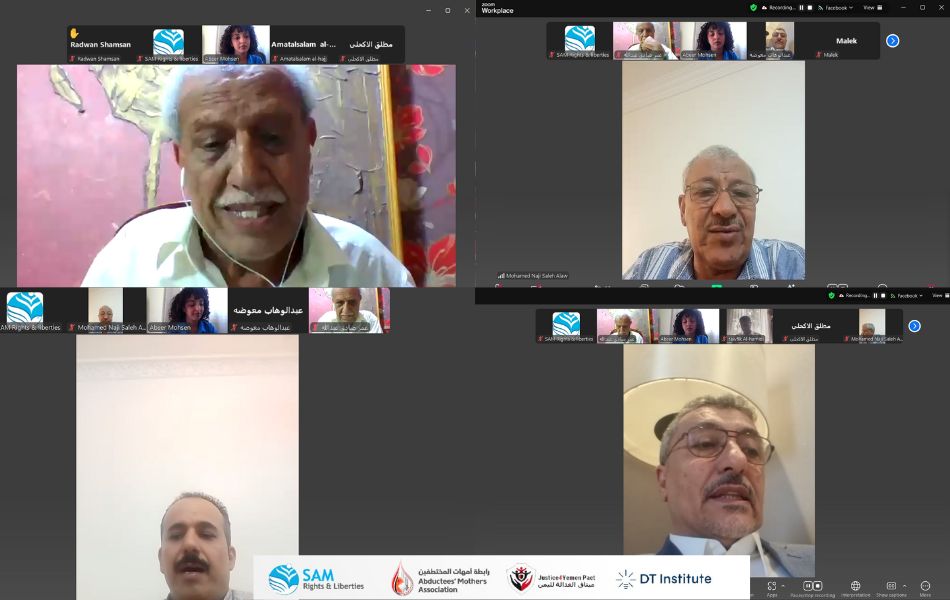
Geneva - SAM Organization for Rights and Liberties and the Abductees’ Mothers Association, members of the Justice4Yemen Pact Coalition, in collaboration with DT Institute, held a webinar titled "Transitional Justice in Yemen: Perspectives of Political Forces and Implementation Challenges," as part of the "#SPARK" project aimed at activating national efforts and political dialogue on the future of transitional justice.
In the opening remarks, Tawfiq Al-Hamidi, President of SAM Organization, highlighted the importance of the meeting as a vital space for sincere and open dialogue among Yemeni political forces, aimed at enriching the societal discussion that could pave the way for a transitional justice process—one that Yemenis aspire to in order to avoid a recurrence of cycles of violence and conflict. He expressed his hope that this gathering would be exceptional and fruitful, particularly as it brings together influential and active actors in the Yemeni political landscape, with the aim of reaching insights and recommendations that serve the future of justice and national reconciliation.
Abdulwahab Mahmoud, head of the General People's Congress parliamentary bloc, considered transitional justice still a relatively new concept in Yemen, pointing out the clear legislative vacuum, as no specific law has yet been approved despite a previously drafted bill. Mahmoud further indicated that the most significant challenge is the multiple phases of conflict Yemen has experienced and the difficulty of clearly defining a timeline that transitional justice should cover. He stressed that initiating comprehensive national reconciliation among political and societal forces must precede any implementation of transitional justice mechanisms, particularly given the absence of state institutions.
Ali Al-Dhalei, member of the Central Committee of the Nasserist Unionist People's Organization, emphasized the importance of transitional justice in enhancing social peace and national reconciliation. He mentioned essential prerequisites such as the restoration of state institutions and stability. Al-Dhalei pointed out significant challenges including the weak documentation of historical violations, lack of genuine acknowledgment of past mistakes, and entrenched tribal and social norms that may obstruct genuine transitional justice. He explained that achieving substantial progress is difficult without a unified state and unified security and judicial institutions, as well as an end to the multiplicity of armed militias.
Lawyer Mohammed Naji Allaw, head of the Legal Department of the Yemeni Congregation for Reform (Al-Islah), stated that implementing transitional justice requires a stable political environment and a strong state capable of enforcing justice and ensuring fairness. Allaw reviewed several international experiences, such as Rwanda, South Africa, and Morocco, emphasizing their success due to strong political will, unified leadership, and capable state institutions. He highlighted the current complexities in Yemen due to division, proliferation of militias, and lack of political consensus on transitional justice principles, asserting that genuine political reconciliation must come first as a foundational step toward any future transitional justice.
Lawyer Mutlaq Al-Akhaly, a member of the Central Committee of the Yemeni Socialist Party, stated that discussing transitional justice amid ongoing war and political fragmentation raises major challenges and deep questions—particularly in light of the declining civic momentum and the absence of genuine will from some actors who prefer to avoid addressing this issue. He explained that the war had disrupted the justice process initiated after 2011, yet it left behind a legacy that can still be built upon, such as reparations funds and the outcomes of the National Dialogue. Al-Akhaly emphasized that justice must precede reconciliation, asserting that any political agreement that fails to address victims' rights or prevent future violations would merely normalize the outcomes of war, rather than represent a true step toward peace.
In concluding the webinar, participants recommended strengthening national dialogue among diverse political forces, activating coordination and cooperation mechanisms, and raising awareness about transitional justice and its importance for overcoming the past. Additionally, the webinar called for serious efforts toward restoring a unified state capable of enforcing law and justice, alongside enhancing trust among Yemeni parties as a crucial step to ensuring Yemen's stability and future.